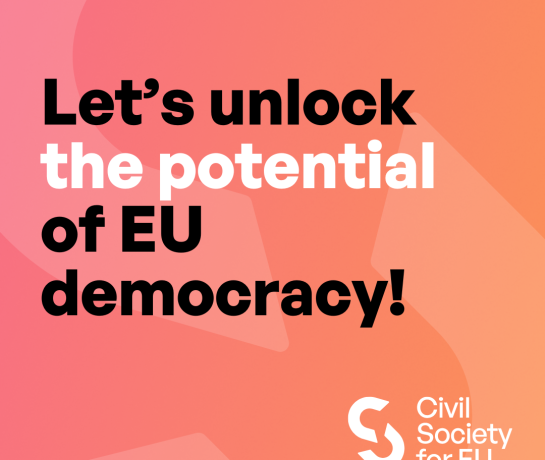Following months of successful campaigning, “Civil Society for EU” has been relaunched with a refreshed
- Latest updates
A thriving democracy requires freedom of association, assembly and expression in an open and safe environment.
However, civil society actors are under increasing political and legal pressures that can affect their ability to operate and their role in upholding people’s democratic rights.
Restrictive laws, administrative barriers and political threats are all challenges that civil society faces, often resulting in difficult environments for organisations, employees and volunteers. Democratic backsliding in some member states is also restricting civic space, meaning there is less opportunity for civil society to operate freely and hold those in power to account.
Social Platform calls on EU institutions to recognise and support the vital role of civil society in promoting fundamental rights and democratic principles, and to protect civic space by ensuring the rule of law is upheld across all member states.

Special Eurobarometer 477
An open, safe, accessible, and enabling regulatory environment is a prerequisite for civil society to thrive.
Through our jointly led campaign, Civil Society for EU, we call for a Civil Society Strategy to ensure that restrictions to civic space and barriers to action are removed, that an EU mechanism is in place to protect civil society, activists and defenders, and that adequate funding and resources are available.

Following months of successful campaigning, “Civil Society for EU” has been relaunched with a refreshed
Trust in political institutions will plummet if decision-makers fail to follow up on promises to
At the last European elections in 2014, the average voter turnout across Member States hit
Decision-makers, civil society representatives, social partners, influences and citizens gathered in Texel in the Netherlands
Statement following Social Platform’s General Assembly of 4 April 2019 In this important transition year
Published on EurActiv, 22 May 2018 Guest Blog Post by Jana Hainsworth is president of
We, 11 EU civil society organisations, are writing to express our concerns following NATO Secretary
As the new European Commission sets out to design the next long-term EU budget, the
Today, the European Commission published the highly anticipated Action Plan implementing the European Pillar of
The latest European Parliament Eurobarometer Survey reveals that the COVID-19 crisis has strengthened citizens’ beliefs
Europe needs a renewed commitment to social progress, where everyone’s socialrights are recognised and vindicated.
Tackling climate change is an urgent priority for the security of our planet and futuregenerations,
Discover all our work areas
Read about what Social Platform is calling for across different policy areas as well as our advocacy work and activities on each issue.
| Cookie | Duration | Description |
|---|---|---|
| lang | session | LinkedIn sets this cookie to remember a user's language setting. |
| S | 1 hour | Used by Yahoo to provide ads, content or analytics. |
| __cf_bm | 29 minutes | Cloudflare set the cookie to support Cloudflare Bot Management. |
| Cookie | Duration | Description |
|---|---|---|
| _gat | 1 minute | Google Universal Analytics sets this cookie to restrain request rate and thus limit data collection on high-traffic sites. |
| __utma | 1 year 1 month 4 days | Google Analytics sets this cookie to distinguish users and sessions. The cookie is created when the JavaScript library executes and there are no existing __utma cookies. The cookie is updated every time data is sent to Google Analytics. |
| __utmb | 30 minutes | Google Analytics sets this cookie to determine new sessions/visits. __utmb cookie is created when the JavaScript library executes and there are no existing __utma cookies. It is updated every time data is sent to Google Analytics. |
| __utmc | session | Google Analytics sets this cookie to enable interoperability with urchin.js, an older version of Google Analytics and is used in conjunction with the __utmb cookie to determine new sessions/visits. It is deleted when the user closes the browser. |
| __utmt | 10 minutes | Google Analytics sets this cookie to inhibit the request rate. |
| __utmz | 6 months | Google Analytics sets this cookie to store the traffic source or campaign by which the visitor reached the site. |
| Cookie | Duration | Description |
|---|---|---|
| CONSENT | 2 years | YouTube sets this cookie via embedded YouTube videos and registers anonymous statistical data. |
| vuid | 1 year 1 month 4 days | Vimeo installs this cookie to collect tracking information by setting a unique ID to embed videos on the website. |
| _ga | 1 year 1 month 4 days | Google Analytics sets this cookie to calculate visitor, session and campaign data and track site usage for the site's analytics report. The cookie stores information anonymously and assigns a randomly generated number to recognise unique visitors. |
| _ga_* | 1 year 1 month 4 days | Google Analytics sets this cookie to store and count page views. |
| _gid | 1 day | Google Analytics sets this cookie to store information on how visitors use a website while also creating an analytics report of the website's performance. Some of the collected data includes the number of visitors, their source, and the pages they visit anonymously. |
| Cookie | Duration | Description |
|---|---|---|
| NID | 6 months | Google sets the cookie for advertising purposes; to limit the number of times the user sees an ad, to unwanted mute ads, and to measure the effectiveness of ads. |
| VISITOR_INFO1_LIVE | 5 months 27 days | YouTube sets this cookie to measure bandwidth, determining whether the user gets the new or old player interface. |
| YSC | session | Youtube sets this cookie to track the views of embedded videos on Youtube pages. |
| yt-remote-connected-devices | never | YouTube sets this cookie to store the user's video preferences using embedded YouTube videos. |
| yt-remote-device-id | never | YouTube sets this cookie to store the user's video preferences using embedded YouTube videos. |
| yt.innertube::nextId | never | YouTube sets this cookie to register a unique ID to store data on what videos from YouTube the user has seen. |
| yt.innertube::requests | never | YouTube sets this cookie to register a unique ID to store data on what videos from YouTube the user has seen. |
| Cookie | Duration | Description |
|---|---|---|
| COMPASS | 1 hour | Description is currently not available. |
| uv_2874821686796249763 | 1 day | Description is currently not available. |
| uv_3113291211026632736 | 1 day | Description is currently not available. |